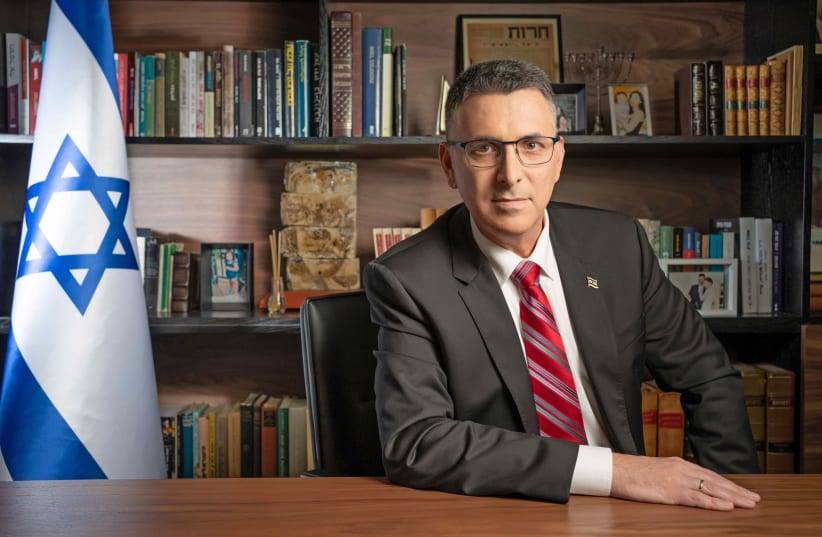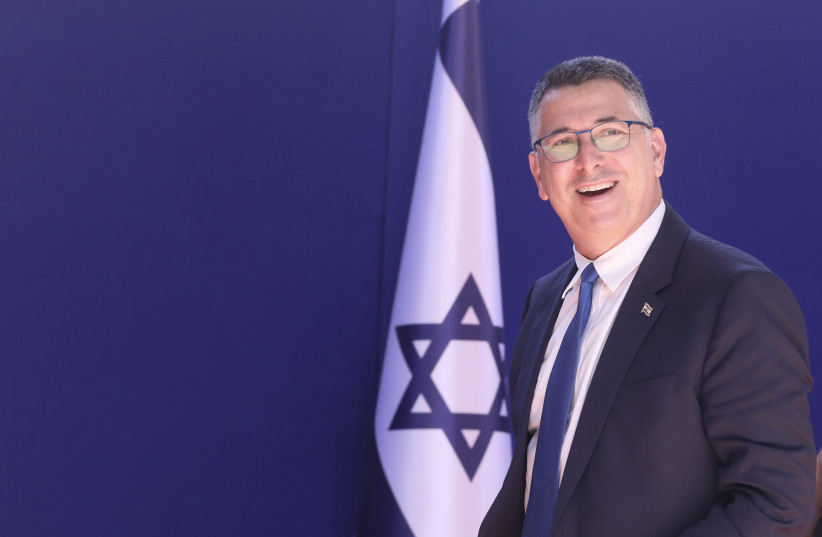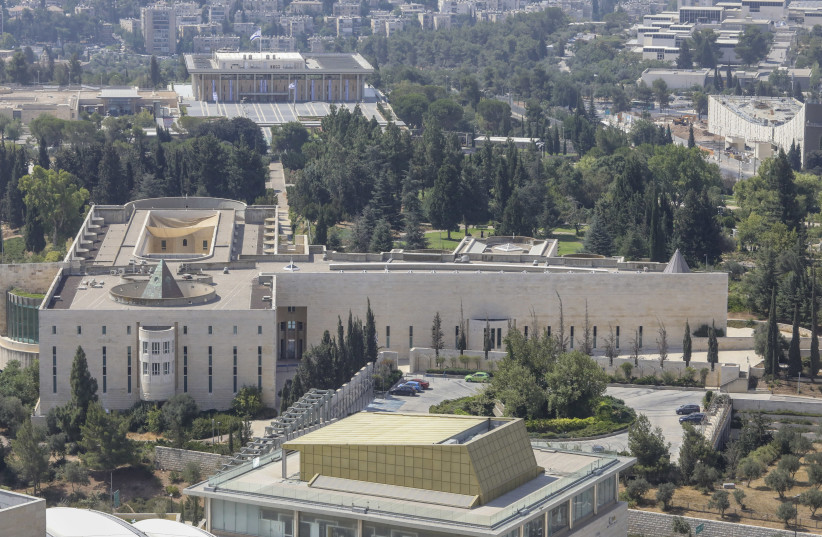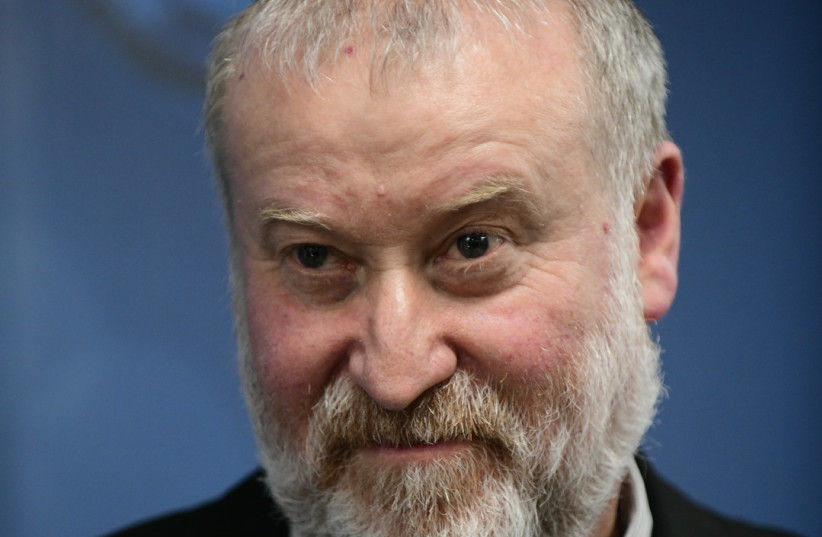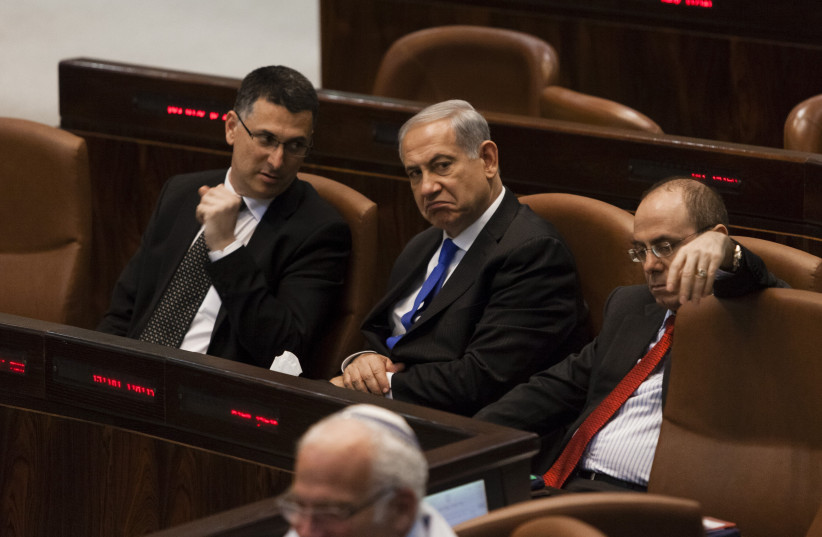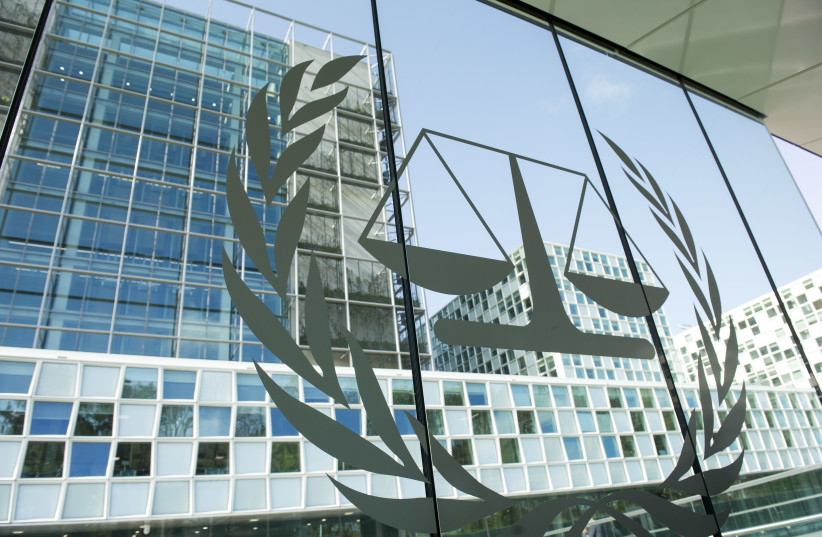Besides likely passing a budget and unseating former prime minister Benjamin Netanyahu, it is not clear that the current government will have much of a lasting legacy in changing the country on any major issues.
This could be true for most ministers, with the exception of Justice Minister Gideon Sa’ar who recently gave an exclusive interview to the Magazine.
Though he moved aside to pave the way for Naftali Bennett to take the prime minister’s chair, it is Sa’ar who may have the greatest actual impact of all of the ministers, by reshaping the courts and the powers of the attorney-general for decades to come.
Despite the uproar about Meretz Party officials meeting with Palestinian Authority President Mahmoud Abbas, Sa’ar is moving, sometimes publicly and sometimes under the radar, to shift the balance of power on the Supreme Court from the liberal camp to the conservative camp.
If one of his influential predecessors, Ayelet Shaked, failed to get even close to splitting the attorney-general’s office into a separate chief legal adviser and chief prosecutor, Sa’ar is closer to succeeding on this dream of the ideological Right than anyone to date.
Sa’ar was mum about exactly who he would push for as head of the powerful Judicial Selection Committee from the list of 24 candidates to fill the four slots currently open on the Supreme Court.
After making appointments to those four vacancies due to be filled by the end of November and to two more openings in 2023, Sa’ar and the committee will have replaced more than one-third of the court. The court has already been changed from one overwhelmingly filled by liberals to that of one with a razor-thin edge of moderate liberals over conservatives.
But if he gets even a two to two split of conservative appointees to liberal appointees, this could slide the court decisively into the conservative column given that three liberal or moderate-liberal justices are retiring and only one moderate conservative is.
Projecting the strength that comes from behind the formidable desk of the justice minister, Sa’ar said, “It is a high-quality list and diverse on all sides. I don’t judge people just on if they are conservative or liberal. There are lots of other ways to measure. Some have more civil law backgrounds and some experience with government administrative committees. Even within criminal law, there are those who are more defense-minded versus those who are more prosecution-minded.”
“There are two goals: excellence and diversity. The High Court has gotten more heterogeneous over the last 15 years than before... this is good... I helped contribute to this through the 2007 law,” which changed the makeup of the Judicial Selection Committee to require a seven out of nine vote consensus for each candidate to be selected, he said.
Further, reports indicate there will be a push to appoint conservatives like District Court Judge Ram Winograd and former state bankruptcy chief David Hahn.
Regarding commenting on a controversy that erupted on Monday threatening District Court Judge Khaled Kabub’s almost-guaranteed seat to fill the traditional Israeli-Arab seat on the court with Justice George Kara retiring, Sa’ar was careful.
Sa’ar said he did not want to discuss the specific allegations regarding Kabub. The controversy surrounds whether Kabub knew some of the problematic activities of some Israeli-Arab activists he had met who had worked with his father.
But he also would not promise that Kabub’s seat was 100% solid. Further, he said that it was even possible for the committee to add new names to the 24-person list. This remark leaves open the implication that there would need to be an Israeli-Arab candidate to replace Kara, so if need be, a new Israeli-Arab candidate could be added. Sa’ar clarified, though, that this was not his preference, since the law would require a delay to republish the updated list.
Meanwhile, he wishes to nominate the four new justices by the end of November, and adding new candidates could cause a delay.
What about the other two slots which must be filled by October 2023?
Technically, according to the very complex coalition agreement, Sa’ar is due to leave the Justice Ministry for the Foreign Ministry in August 2023 – a couple of months before the slots would need to be filled.
Sa’ar confidently said these two slots would be filled during his term as justice minister.
He noted that although two of the four Supreme Court seats he and the committee are about to fill have been empty since April this past year, they are appointing two of the seats in advance even though they will not be vacant until April 2022.
While there may be other issues where Sa’ar has compromised – such as his desire to pass a new Basic Law to restructure the separation of powers between the branches of government – he was clear that picking all six justices was a red-line priority for him.
Splitting the roles of the attorney-general
What about Sa’ar’s plans to split the roles of the attorney-general, which seems to have been delayed by at least several months?
“It was not practical to do this, with zero time. We need to pick the right model... I will bring it to the government. There will be different views. Any decision needs the Knesset. We know the situation and there is no way to do all of this before the selection” of the new attorney-general by February 1, he said.
The justice minister explained, “We cannot do this before there is a new attorney-general or before the budget passes. Anyone who will be selected will know that the splitting of the attorney-general’s current powers could happen.”
Does this mean that he would disqualify any candidates who did not accept the idea of splitting the office’s powers?
On one hand, he responded, “I do not want to make preconditions. But [Attorney-General Avichai] Mandelblit says it is not a legal problem.”
On the other hand, he acknowledged that Mandelblit personally does not view the splitting authorities as the right policy and he said, “If someone says they will only be [the] attorney-general” without the powers split, Sa’ar said, “we will take this into account.”
He was also non-committal on Raz Nizri, one of the top and also more conservative deputy attorneys-general, or about any other specific candidate to fill the post.
Still, in the world of Sa’ar’s nuanced answers, this was a pretty clear message to the potential candidates that their chances of being picked if they oppose the split are close to nil.
Can Sa’ar really get this major change made after the budget is passed and the left-wing parties of the coalition have less reason to cooperate with an initiative they generally oppose?
Sa’ar responded that in the three governments he served in, “I do not remember a situation where I put forward a bill and did not get a majority. If I bring it forward, I will make sure to get a majority.”
He also said that Yesh Atid is obligated to vote for the bill within the coalition. This means that even if left-wing parties might initially oppose the bill, if the vote carries in the coalition, they will be obligated to vote for it eventually in the Knesset.
Does he consider legislation for a prime minister term limit and anti-indictment bills for PM as not personal?
While the government’s top immediate goal in the Knesset is passing the state budget, Sa’ar is not waiting to advance the legislation he cares most about: The proposals known to the public as the “anti-Bibi” bills.
The first bill would limit a prime minister to eight years in office. The second would prevent a candidate under indictment from forming a government. Both bills will be presented this month before the budget passes into law.
Sa’ar insists that neither bill is personal legislation against opposition leader Benjamin Netanyahu. The first would not grandfather-in Netanyahu, who is the only living Israeli to serve eight years as prime minister. If that bill passes, he could still serve another eight years.
“The Likud is spreading misinformation before seeing the bill,” Sa’ar said.
Neither bill would take effect until the next Knesset. That means that if there is a constructive no-confidence motion in the current Knesset, Netanyahu could still return to power, but if the second bill passes, he could not be prime minister in the next Knesset unless he is cleared of his corruption charges.
“I just want there to be a norm that there already is with mayors,” he said. “The bill isn’t personal; the opposition to it is personal. There is one party held captive by its leader and his trial. It isn’t an ideology to enable someone under indictment to be prime minister. We saw what happens when a prime minister under indictment tries to run a country. He kept initiating elections to remain in power when the next attorney-general would be chosen. A country cannot be subordinate to the interests of one person.”
Sa’ar said he will lobby his fellow ministers to get a majority, and he believes both bills will pass. But he will not get in the way of the next Likud leadership race, in which Netanyahu’s potential challengers would quietly be happy to see the bills pass before the race would be held.
“I won’t interfere in Likud,” he said. “They are sovereign to make their own decisions.”
But the first bill Sa’ar passed into law in this Knesset was also about his former party. It allows four MKs to break off from a large party instead of a third of the faction, which in Likud’s case would be ten MKs. Sa’ar said he did not have in mind any potential defectors, but he does not rule out trying to implement the bill in this Knesset.
He chose to set it at four MKs because it is the minimum amount of MKs to cross the threshold. After twenty years ago, when only one MK was needed to split and then a third of a faction, which is the opposite extreme, Sa’ar saw four as the proper compromise.
But it is also obvious that Ra’am (United Arab List) happens to have four MKs, and there are MKs who would feel more comfortable not to have to rely on Mansour Abbas’s party in every vote. Sa’ar said he has no problem partnering with Ra’am.
“You don’t identify with everything your partners do in a coalition system, but the views of Ra’am were known to me, and nothing has happened that I couldn’t tolerate,” he said. “All the parties except one agreed to sit with Ra’am. I do not accept a double standard in which what is acceptable for Netanyahu is forbidden to me.”
He continued, “Ra’am only wants to deal with civil issues. It’s an important experiment and I hope it works. I wish the coalition was wider, but I have no regrets about forming the current government. We saved Israel from more deterioration and instability. Imagine if we were going to elections now instead of passing the budget.”
Israeli-Arab violence wave and using the Shin Bet
The current wave of Israeli-Arab violence is a greater threat to the State of Israel than Hamas and Hezbollah, Sa’ar warned, noting that 50% of murders in the Arab sector remained unsolved.
“The phenomenon of organized crime [in the Israeli-Arab sector] endangers Israel more than external threats,” he said. “If you do not know how to deal with this issue, it will cause neighborhoods to crumble to pieces from within.”
Addressing the potential pitfalls of involving the Israel Security Agency (Shin Bet) in combating the murder wave, as opposed to leaving the police to handle it, Sa’ar said the “Shin Bet Law empowers the agency to deal with organized crime,” such as the current Israeli-Arab wave of violence that is “undermining the foundations of the rule of law.”
“It is smart,” he said. “This is a hard situation, and we need all of the state authorities. We are not using them to replace the police tomorrow, but they [the Shin Bet] can help in different ways.”
When it was noted that many Shin Bet officials would prefer not to be involved in anything beyond their more regular counterterrorism mission, Sa’ar said: “They will come committed to the effort” when called on.
Furthermore, elements of the current wave of violence also have spilled over into nationalistic crimes, and the Shin Bet’s capabilities were most appropriate for combating the approximate 500,000 illegal weapons in the Arab-Israel sector, he said.
Sa’ar said he would insist on completing the passage of a bill requiring minimum jail sentences for possessing illegal weapons. He said he would also widen the authority of economic courts to take action against the tax evasion and money laundering of organized crime and enable police to take more steps to prevent evidence from being lost.
Meretz meets with Mahmoud Abbas
By contrast, Sa’ar downplayed the significance of the other Abbas, who leads the Palestinians. He said the meeting of Meretz ministers with Palestinian Authority President Mahmoud Abbas was a waste of time.
“Such a meeting doesn’t have such diplomatic importance,” he said. “The PA is still trying to prosecute our soldiers in The Hague and paying terrorists and their families. As long as they don’t stop, I won’t meet Palestinian officials. The Left’s representatives in the coalition could be frustrated by it and they may have political needs, but this government as it is composed will not enable the formation of a Palestinian state in Judea and Samaria, which would endanger Israel.”
International Criminal Court
Moving on to Israel’s showdown with the International Criminal Court over alleged war crimes, he was asked to address speculation that even as the new ICC Prosecutor Karim Khan has not bothered Israel in his first three months in office, down the road Israelis could be facing international arrest warrants.
“I do not want to get into speculation. I do not know what is the basis of this speculation. We know the IDF is the most ethical army and we know Israel has internal investigation processes if something happens with the IDF that is improper – and that this [the investigations] are more than what happens in most Western armies.”
Sa’ar said that The Hague’s criminal investigation is a political drama manufactured by the Palestinian Authority.
He said the PA “is not interested in solving the conflict and is taking steps against Israel. The process [at the ICC] is about delegitimizing Israel.”
“How I relate to the PA is influenced by this. The PA is using terror in its strategy... but what they do against Israel is no less harmful.”
“The prior chief prosecutor made a decision at the end of her [nine-year] term. I do not want to comment on this too much publicly other than these general principles: I do not think the court’s decision was correct. It was based on a complaint sent from a non-nation-state [the PA] who therefore had no right [to file a complaint.]
Further, he added, “the substance also is wrongheaded. Israel has a legal apparatus which probes these issues. I just hope this will be handled differently in the future as opposed to the manner in which things have been handled previously.”
One important spin-off issue is who will be handling the PA’s moves against Israel at the ICC for the Justice Ministry going forward. Since October 2013, Deputy Attorney-General for International Affairs Roy Schondorf has spearheaded the issue at the expert-professional level and is credited, along with other parts of Israel’s legal team, with at least delaying the current criminal probe by around six years from the start of the preliminary review in January 2015.
His eight-year term is due to expire later this month, but the selection process for replacing him has not started.
The Magazine understands that the most likely scenario at this point is that Sa’ar will extend Schondorf’s term for a period of months until there has been a replacement process, and possibly until a new attorney-general can weigh in on the issue after February 1 about who will handle the ICC-PA portfolio.
Reopening American consulate for Palestinians in east Jerusalem
Sa’ar said he would also do everything possible to prevent the reopening of an American consulate in central Jerusalem that would serve the PA, even if the Biden administration demands it.
“Jerusalem is a matter of principle,” he said. “Relations with America are very important. I heard the views in Washington, but our views on Jerusalem as our eternal capital are no less strong. It requires Israeli approval, and the US can’t do it unilaterally. So they will need to consider our view and our principles.”
Sa’ar also intends to prevent Labor and Meretz from changing the Finance Ministry’s list of preferred communities, which currently gives benefits to many settlements. The list is set to come to a vote in the months ahead.
“We will stand for our principles, and we won’t let a map be created that goes against our outlook,” he said.
As for Labor’s proposal for a new Basic Law on Equality, Sa’ar said that in the previous Knesset, he presented a bill to put the principle of equality in the current Basic Law on Human Dignity and Liberty, and he would still support doing that, but he would not enable passing a new law.
Case 3000 Submarine Affair State Commission
In what was seen as a gesture to Blue and White leader Benny Gantz, Sa’ar authorized the formation of a government commission of inquiry this week to probe the so-called submarine affair. The commission could address proper governance issues beyond the Case 3000 criminal case against some of Netanyahu’s former top aides, which would mean also reviewing Netanyahu’s role in it, though the former prime minister is not a defendant in the criminal case.
Asked if he took the step to quell Gantz’s political independence, he said that when Gantz demanded the probe in the press, immediately after the government was formed, he did not handle it the right way, but it has since proceeded quietly behind the scenes.
“There are things in his authority and some in mine, and there was a dialogue between our ministries,” he said. “It actually happened weeks ago and no one asked me about it until this week.”
When asked if he was worried about Gantz bringing down the government and forming a coalition with Likud, Sa’ar said: “I do not think Benny has such good memories from his partnership with Netanyahu. I do not think a smart guy like Gantz would do that.”
Sa’ar may not have quite the same swagger he had when polls had him reaching 17 seats last year, but in the historical record, he may make the largest mark from the current government.
